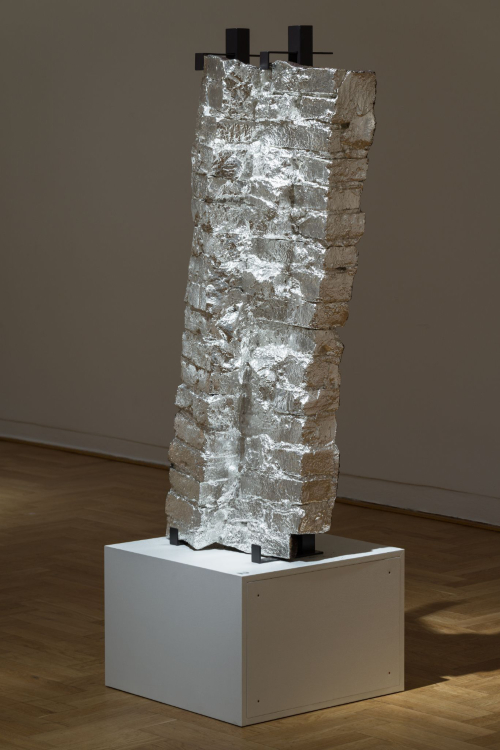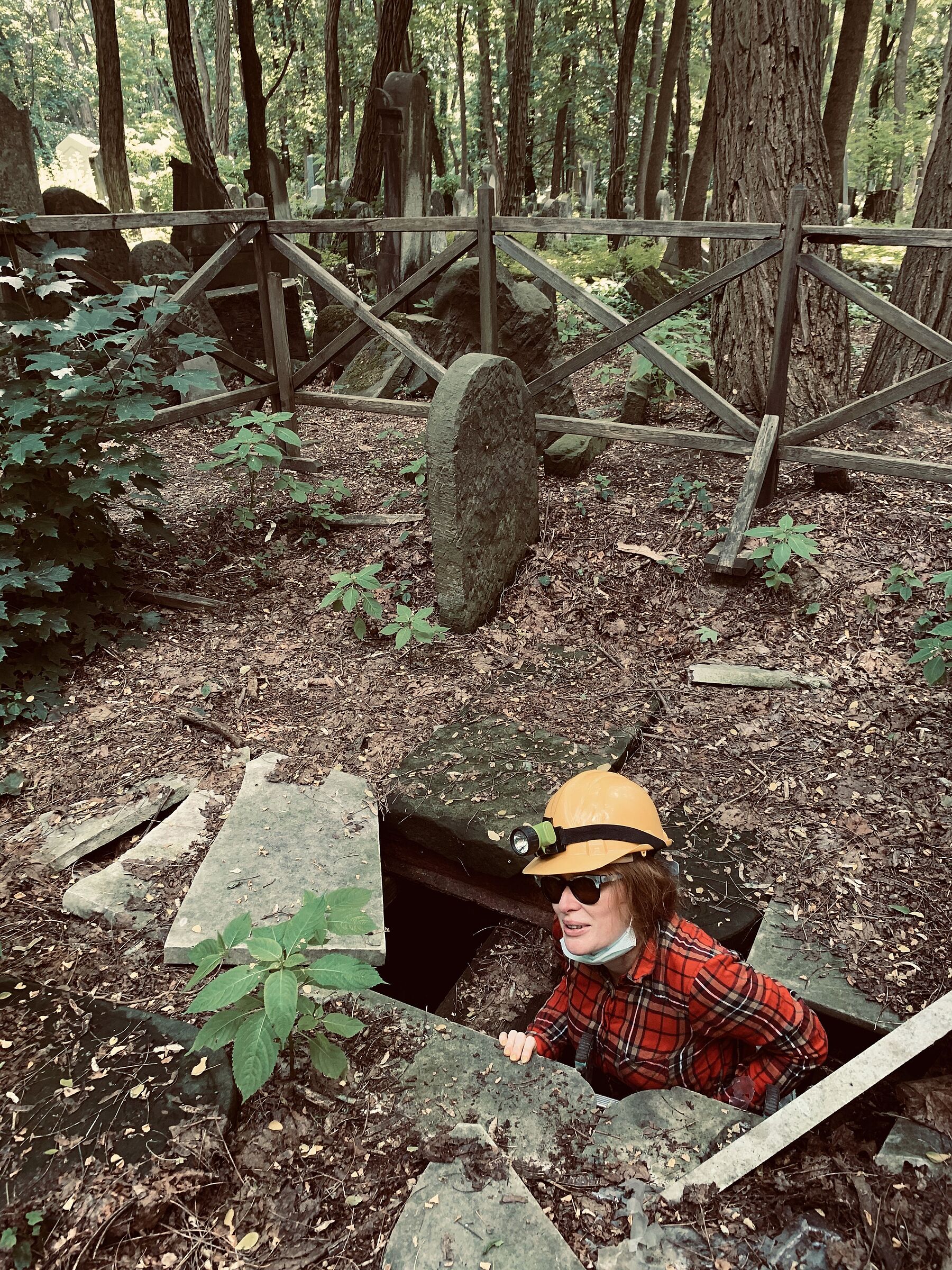Daniel Schönpflug: The section “My Favourite” is dedicated to presenting a Fellow of the current year through an object or place of their choice. This time we take off from an enigmatic sculpture. It was shown on several occasions, but lately in the exhibition “Hideouts. Architecture of Survival” at the Jewish Museum in Frankfurt. I am speaking with the creator of the sculpture. Welcome, Natalia Romik! What are we looking at?
Natalia Romik: The photo shows a sculpture representing part of a hideout located in a vacant lot at the Jewish Cemetery in Warsaw. It is a 1:1 scale cast of a section of the wall. The entire hideout measures three meters in length and two meters in width. During the German occupation of Poland in the Second World War, it served as a refuge for Jews persecuted by the Nazis.
Creating the cast for the sculpture required a complex process. It began with a silicone and plaster mold taken from the original site—a task that took us over a week. To enhance the mold, we used acrylic and soil. Finally, as you can see, the sculpture was coated in silver. I applied silver flakes as a tribute to the amateur architects who built makeshift shelters to protect themselves and their loved ones. The silver also acts as a mirror, allowing viewers to see their reflection in the past—though, as the silver erodes over time, this reflection becomes increasingly distorted.
DS: Do we know who hid in the hideout?
NR: We know of several people who found shelter in the hideout located in the Orthodox quarter of the cemetery, in section no. 41. It was originally created by Isaac Posner, who was then the director of the cemetery, with the help of Moshe Aroniak, a stonemason. They extended the lot designated for a grave, bricked up the walls of this makeshift bunker, constructed the roof using tram rails, and covered it—for the sake of concealment—with matzevot, Jewish tombstones.
This case is unique because Posner and Aroniak had specialized knowledge and the proper tools for building a shelter. In contrast, in other cases I researched for my project, the Jewish builders were amateur constructors. They had no prior knowledge of masonry or architecture and no proper tools—only spoons or knives. Yet all of them had to work in secrecy, under the constant threat of death at the hands of German soldiers or police. They also lived in fear of being discovered and betrayed by Polish or Ukrainian schmaltzovniks, who handed Jews over for financial gain.
Returning to the hideout on Okopowa Street: through a conversation with a former director of the cemetery, I learned about Abraham Carmi, who found shelter inside the grave as a teenager. He was one of only two Jews hiding there who survived the war. All the others were discovered and killed on the spot in 1942.
Four years ago, I visited Abraham in Israel, where he lives on a kibbutz. Now 98 years old, he shared many stories about his life in hiding during the Nazi occupation. According to him, there was not just one, but several places where Jewish people sought refuge. However, the grave remains the only hiding place in Warsaw that has survived to this day, as 90 percent of the city’s architecture was destroyed during the war.
DS: Would you say that people were hiding in the grave or that they were hidden there?
NR: In some of the cases I researched, Jews found and built hideouts on their own; in others, they received external help. I see my project as a tribute to the agency of people in hiding—their ingenuity and will to survive.
In this particular case, when Abraham was searching for shelter, he was still a teenager. He told us that he helped prepare his own hiding place. However, he cannot recall how long he stayed in the bunker—whether it was a few days or several weeks. His memory is blurred. He was a child in need of shelter and support, yet at the same time, he should be recognized as an architect of his own survival.
DS: What happened to the site after 1945?
NR: After the war, the story was forgotten, and the site was only rediscovered ten years ago. At that time, a small piece of graffito left by Abraham was found. Written in Hebrew, it read: “I was here, Abraham Carmi. This used to be my bunker.” Apart from that, we found several objects, such as coins and metal brackets, which we presented as part of the exhibition, alongside other documents accompanying the sculpture. Together with Aleksandra Janus, with whom I worked on this case, we are currently in the process of creating a memorial at the site to commemorate the Jews who hid there. Its purpose will be to preserve the hideout.
DS: Can you say more about what it means to unearth such a site and to commemorate the Holocaust in Poland today?
NR: During the eight years of the Law and Justice Party’s rule, commemorating the Holocaust became increasingly challenging due to the government’s emphasis on Polish suffering and heroism. Research on the Holocaust that shed light on Polish involvement in these crimes was strongly discouraged and, at one point, even persecuted.
Another sensitive issue is the fate of so-called post-Jewish properties and towns, which were resettled by non-Jewish populations after the Holocaust. Despite political pressure, organizations such as the Polish Center for Holocaust Research continued their work, along with many other institutions, NGOs, independent scholars, and activists who tirelessly strive to uncover and preserve this history. Since Law and Justice is no longer in power, things have fortunately become somewhat easier; however, the future remains uncertain due to the rise of antisemitism.
My research was conducted in Poland and in Western Ukraine—which was part of Poland until the end of the Second World War—with the help of local partners such as the Center for Urban History of East-Central Europe in Lviv. It was a cruel coincidence that the exhibition where I presented my findings opened in Warsaw in March 2022, barely a month after the full-scale Russian invasion of Ukraine began.
In any case, I received most of my research funding through grants from France and Germany. However, the exhibition was commissioned by the National Gallery of Art Zachęta in Warsaw and the Center of Contemporary Art TRAFO in Szczecin, both of which supported the project with all the resources at their disposal.
DS: Your work seems to perfectly fit into the category of “artistic research”? Do you relate to that category? How do you reflect on it?
NR: I completed my MA in political science in Warsaw and Berlin but have worked as an artist and researcher ever since. My artistic and architectural interventions, combined with archival queries and historical investigations, were at the core of my PhD project at the Bartlett School of Architecture in London, supervised by Jonathan Hill, Murray Fraser, and François Guesnet.
Interdisciplinary studies and artistic research have strongly influenced my career, as I operate at the intersection of the artistic domain, the academic context, and public museums. For example, when I built the Nomadic Shtetl Archive—a mobile, mirror-clad vehicle that I deployed in formerly Jewish towns in southeastern Poland—its artistic form supported my efforts to publicly address even highly sensitive issues, such as the restitution of Jewish property or local pogroms. It was on the basis of archival and architectural research that I was able to create artistic projects, which, in turn, became forums for engaging with the local public
DS: You will be a Fellow at the Wissenschaftskolleg from February to July 2025. What will you do during your residence?
NR: I have many plans. Over the past four years, while working on the architectures of survival, I have gathered more than 100 testimonies from Holocaust survivors about hideouts. Most of these places no longer exist. To preserve their memory, I would like to draw them, build models, and perhaps write a book about them. I am also interested in extending my research to the present. People continue to use hideouts and shelters—for example in Ukraine.

